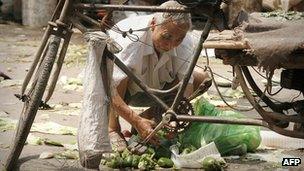Could China help Europe conquer its debt woes?
- Published

Some in China question why they should bail out richer Europeans
As European leaders face another tumultuous week of crisis talks, austerity cuts and bailout decisions, an offer of help will be fresh in their minds.
Last week, China suggested that it might be prepared to help Europe by acting as a buyer of last resort by making a major purchase of euro-denominated bonds.
Markets are hoping for more details when officials from the Bric countries - Brazil, Russia, India and China - meet in Washington on Thursday to discuss steps to offer support to the debt-ridden euro area.
But should and could China come to Europe's rescue in the continent's escalating debt crisis?
Cash pile
Certainly, China has the means. Its foreign exchange reserves are the world's largest at $3.2 trillion (£2tn).
China also has a vested interest in ensuring the global economy is stable and that demand for its products in Europe remains strong. A weaker euro would make Chinese exports more expensive for Europeans.
But so far, says Dong Tao, Asia economist at Credit Suisse in Hong Kong, there is little evidence that the debt crisis has hurt demand for Chinese exports.
"My view is that China can and will buy a little more euro-denominated bonds as a token gesture," Mr Tao says.
"If there were signs of a slowdown in China, you could see a more sizeable offer of help [for Europe], but at the moment there is clearly not a slowdown."
Political price
Helping the indebted euro zone would also allow China to achieve other goals - few countries extend financial support without some strings attached.
Last week when offering to help Europe, Premier Wen Jiabao said he wanted Europe to treat China as a full-market economy, which could boost exports otherwise hindered by tariffs.
An offer of help could also help China in its quest to buy other assets in Europe that have so far been viewed with disquiet.
A recent $85.8m deal by a Chinese businessman to buy a remote, 300-sq-km Icelandic farm to build a leisure resort was viewed in some quarters as part of a broader Chinese strategy to build influence in the resource-rich Arctic.
China also has port projects in Piraeus, Greece, and Naples in Italy that have raised eyebrows.
"A friendly move by China may open the door to other assets coveted by China in Europe, like key infrastructure such as ports and [investments in] advanced manufacturing sectors, which China is building up," says Ren Xianfang, an analyst at IHS Global Insight in Beijing.
More broadly, supporting Europe would help boost China's role in financial diplomacy and its push for a new global financial order less dominated by Europe and the United States.
Sceptics
Within China, many question whether a country where many still struggle to put food on the table and a third of the population still lives on less than $2 a day should help out Europeans with their arguably easier lives.
On web forums some Chinese are sarcastically wondering why "those who eat congee and pickles are being asked to help those who feast on steak and French wine".
Even among the country's elite, whose fortunes are perhaps more closely aligned to the global economy, there is a sense that China should not step up.
"When the world looks to us for help, we should keep our cool and not feel too flattered," said Liu Changle, the chairman and chief executive of Hong Kong-based Phoenix Television, according to the Wall Street Journal.
"Life is much easier for No 2," he added. "When the sky collapses, there will be a No 1 who will hold it up."
Others point out that China could be facing a debt crisis of its own making given high levels of local government debt that could turn sour.
Not spare cash
Mr Tao, at Credit Suisse, says these sentiments are valid given China's still low GDP per head.
"Why should China use taxpayers' money to help out the sovereign of Greece when the money could better help Chinese schoolkids?" he said.
He also points out that China's vast foreign currency reserves are not the spare cash people might imagine.
They have been accumulated by buying foreign exchange mainly to keep its currency weaker and, as such, its foreign assets are matched by domestic liabilities.
For each dollar or euro of foreign reserves there is the equivalent amount of yuan debt.
"This is not wealth, it is balance sheet expansion," he says.
An editorial in the official People's Daily over the weekend urged that the eurozone area should guarantee any investments China makes.
It also said that China should not take any rescue steps alone, urging co-operation with the EU, IMF and Bric countries.
With all this in mind, it seems unlikely that Beijing is suddenly going to splurge billions on eurozone debt and become the white knight many in Europe might have been hoping for.
- Published15 September 2011
- Published14 September 2011
- Published14 September 2011